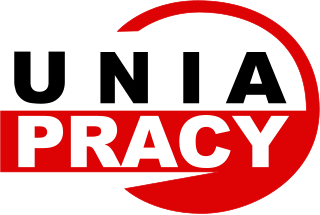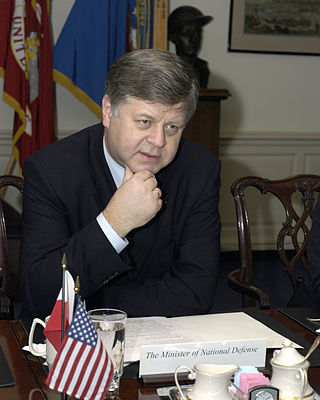
Leszek Cezary Miller is a Polish politician and former prime minister of Poland (2001–2004). He has served as a Member of the European Parliament (MEP) since July 2019.

The Democratic Left Alliance was a social-democratic political party in Poland. It was formed on 9 July 1991 as an electoral alliance of centre-left parties, and became a single party on 15 April 1999. It was the major coalition party in Poland between 1993 and 1997, and between 2001 and 2005, with four Prime ministers coming from the party: Józef Oleksy, Włodzimierz Cimoszewicz, Leszek Miller and Marek Belka. It then faded into opposition, overshadowed by the rise of Civic Platform and Law and Justice.

Labour Union is a minor social-democratic political party in Poland. It was a member of the Party of European Socialists (PES) until April 2022.
The Democratic Party, abbreviated to PD, was a minor social-liberal political party in Poland. It had no members of the Sejm, Senate, or European Parliament.
The Social Democratic Party of Lithuania is a centre-left and social democratic political party in Lithuania. Founded as an underground Marxist organisation in 1896, it is the oldest extant party in Lithuania. During the time of the Soviet Union, the party went into exile, emerging once again in Republic of Lithuania in 1989.
An electoral alliance is an association of political parties or individuals that exists solely to stand in elections.

The Social Democracy of Poland is a social-democratic political party in Poland.

Jerzy Andrzej Szmajdziński was a Polish politician who was a Deputy Marshal of Polish Sejm and previously served as Minister of Defence. He was a candidate for President of Poland in the 2010 election.

The Greens is a political party in Poland.

The Federation of the Greens, frequently referred to as Greens (Verdi), was a green political party in Italy. It was formed in 1990 by the merger of the Federation of Green Lists and the Rainbow Greens.
Poland has a multi-party political system. On the national level, Poland elects the head of state – the president – and a legislature. There are also various local elections, referendums and elections to the European Parliament.

Parliamentary elections were held in Poland on 23 September 2001. All 460 members of the Sejm and 100 senators of the Senate were elected. The election concluded with an overwhelming victory for the centre-left Democratic Left Alliance – Labor Union, the electoral coalition between the Democratic Left Alliance (SLD) and the Labour Union (UP), which captured 41% of the vote in the crucial lower house Sejm. The 2001 election is recognized as marking the emergence of both Civic Platform (PO) and Law and Justice (PiS) as players in Polish politics, while also witnessing the outright collapse of the Solidarity Electoral Action (AWS) and its former coalition partner, the Freedom Union (UW).

Left and Democrats was a centre-left electoral alliance of political parties in Poland which was created on 3 September 2006, before the Warsaw municipal election of 2006. The coalition's aim was to provide an alternative for both Law and Justice and Civic Platform, which have been Poland's two major political parties since 2005. LiD contested their first national election in October, 2007 and won 53 seats to the Polish parliament, the Sejm. The LiD alliance was dissolved in April 2008, following a rift between the member parties.

National Party of Retirees and Pensioners is a minor left-wing political party in Poland. The main goal of KPEiR is protecting retired seniors, pensioners and trust-busting. The current leader is former Sejm Member Tomasz Mamiński.

Waldemar Włodzimierz Witkowski is a Polish politician who is currently leader of the Labour Union, and was formerly one of the leaders of the Left and Democrats coalition, of which the Labour Union was a part. Since 2006 he is a member of the Greater Poland Regional Assembly.

The Social Alliance was an electoral coalition created for the 1998 Polish local elections. Formed on 27 June 1998, the Social Alliance included the Polish People's Party along with its smaller left-oriented party partners, such as the Labour Union, the National Party of Retirees and Pensioners, the Self-Defence of the Republic of Poland and few members of Alliance of Democrats (Poland). The party represented the "independent left" that challenged the anti-communist and pro-communist dichotomy of Polish politics while maintaining a strongly leftist profile inspired by pre-WW2 socialist and agrarian movements. It protested against the capitalist reforms carried out in Poland such as austerity, criticizing them for creating massive wealth inequality. Nevertheless, the coalition cooperated with the post-communist Democratic Left Alliance as well as the Polish Socialist Party.
The centre-left coalition is a political alliance of political parties in Italy active under several forms and names since 1995, when The Olive Tree was formed under the leadership of Romano Prodi. The centre-left coalition has ruled the country for more than fifteen years between 1996 and 2022; to do so, it had mostly to rely on a big tent that went from the more radical left-wing, which had more weight between 1996 and 2008, to the political centre, which had more weight during the 2010s, and its main parties were also part of grand coalitions and national unity governments.

Parliamentary elections were held in Poland on 13 October 2019. All 460 members of the Sejm and 100 senators of the Senate were elected. The ruling right-wing Law and Justice (PiS) won re-election to a second term retaining its majority in the Sejm. However, it lost its majority in the Senate to the opposition. With 43.6% of the popular vote, Law and Justice received the highest vote share by any party since Poland returned to democracy in 1989. The turnout was the highest for a parliamentary election since the first free elections after the fall of communism in 1989. For the first time after 1989, the ruling party controlled one house, while the opposition controlled the other.

The European Coalition was a short-lived electoral alliance and list in Poland. It was established on the verge of 2019 European Parliament election by a group of former prime ministers and former foreign ministers, including Jerzy Buzek, Ewa Kopacz, Grzegorz Schetyna and Radosław Sikorski. They declared the will to construct "one broad list in European Parliament election, the aim of which would be to restore Poland's strong position in the European Union". The Coalition is to be pro-European and centrist.

On Sunday 26 May 2019, a vote was held to elect the Polish delegation to the European Parliament. Polish voters elected 52 MEPs, compared to 51 in the 2014 election. The increased number of MEPs is a result of the 2018 reapportionment of seats in the European Parliament. Following the United Kingdom's announcement, that it will participate in elections to the European Parliament on May 23, Poland will continue to be represented by 51 MEPs. The 52nd MEP will take up their mandate immediately after the UK leaves the European Union. Following the announcement of the election results, the National Electoral Commission indicated Dominik Tarczyński from Lesser Poland and Świętokrzyskie will take up the 52nd seat.
















